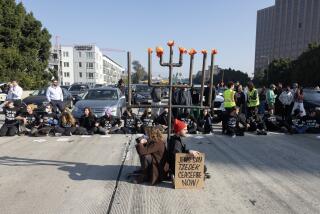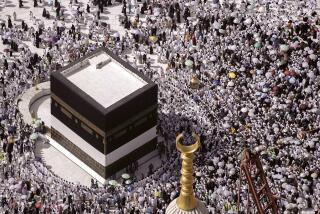Egypt protester’s daily trek could lead to historic change
- Share via
CAIRO — Here is the morning commute of Emad Mohammed, a soft-spoken 35-year-old accountant:
Trudge five miles through the dawn streets. Dodge roving bands of armed regime supporters, who would beat him or worse if they knew where he was headed. Walk across the Kasr-al-Nil bridge, a main artery into central Cairo, as pale morning mist rises from the broad, green river. Step past a line of weary young army conscripts squinting in the morning sun. Stop in front of rolls of barbed wire to dig out his identity card so he can pass into Tahrir Square.
Easy, he says. I’ll do it every day forever, if I have to.
Of course, he and tens of thousands of other protesters are hoping that forever is at hand. They have dubbed this “gomat el-raheel” -- the “Friday of Departure.” On this day, they want President Hosni Mubarak gone.
In the meantime, the daily trek to the square -- its name, Tahrir, means Liberation -- has taken on an almost matter-of-fact, workaday feel. Momentous events unfolding? Yes, of course, people say as they stride hurriedly across the bridge. But right now, I’m just getting myself where I need to be.
Salma Ayman, with a mop of curly graying hair tied back from her face, has a very particular job in mind on this morning. She has gathered up dozens of juice boxes from her own kitchen and is headed to the square to deliver them to protesters. It’s going to be a hot day. People will be thirsty.
“Everyone has to do what they can,” she said.
In cool winter evenings, the Kasr al-Nil bridge -- a majestic 1930s-era span with sweeping views up and down the Nile -- is popular with Cairenes out for an evening stroll, a favored venue for an inexpensive date. In normal days, tourists sometimes posed by the giant lion statues flanking the bridge. Now the stone just beneath them is daubed with graffiti: “Mubarak -- Game Over.”
The crowd of bridge-crossers thickens, and Ahmed Samir, a dapper engineer, keeps an eye on his family: his daughter, his mother and a cousin, all on their way to the square. “We have a comfortable life, you know,” he says. “But comfort is not what matters.”
As for Kameer Ihsan, he has a new workplace wardrobe: a white hard-plastic construction hard hat he will wear in the square.
“Rocks, they will bounce off,” he says, tapping it. “Bullets, maybe not. God will have to protect me.”
More to Read
Sign up for The Wild
We’ll help you find the best places to hike, bike and run, as well as the perfect silent spots for meditation and yoga.
You may occasionally receive promotional content from the Los Angeles Times.






